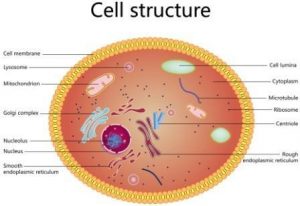Cells are the fundamental units of life; these small living organisms in your dog’s body are responsible for constant communication, responding to environmental changes, and reacting to signals from your dog. If your dog’s cells are compromised, the function of tissues and organs, which are created and made up of cells, can fail. The physical health of dogs, as well as humans, depends on the health of these trillions of cells that create the organs, tissues, and bones that support the body. Keeping your dog’s cells healthy is keeping your dog’s whole being healthy.
Your dog’s body, as well as your own, is constantly replacing old cells with new ones. Providing material and energy, by what your dog is consuming, is how your dog’s body to able to create these new cells. There are some vitamins, minerals, and amino acids that makeup proteins and other cell components, yet cannot be made in the body.
Cell Function
Cells are responsible for a variety of complex functions but there are two very basic processes that are necessary in maintaining health. These two functions are how nutrients enter the cells and how waste materials leave. Cell membranes are largely responsible for this action.
The cell membrane/cell wall encapsulates the cell as a structural boundary that keeps the internal parts secure. It has a semi-permeable filter which allows nutrients to enter and wastes to be disposed of. The membranes are composed of non-water soluble fats. The main function of the fats in the cell membrane is to create shape and maintain stability.
Proteins are also essential to your dog’s cells, helping with communication between cells. Proteins also help cells connect and attach to areas of the body — for example, liver cells stay in the liver by attaching to liver tissue through proteins in the cell membranes. With cancer cells, these proteins are often lacking or not working correctly, which allows the offending cells to move and spread around the body.
Nutrition
Nutrition is extremely important to cellular health. The fats your dog consumes have an effect on his/her cells as the cell membranes are composed of fats. Omega-3 fatty acids, as found in fish and in Elimay Supplements, are necessary for cell structure. Feeding your dog appropriate levels of unsaturated fats, such as Omega-3s, is an easy way to support healthy cell membranes.
Dogs that are fed a commercial diet are less likely to get the appropriate amounts of ‘good fats’ like omega-3s. If your dog is eating a commercial diet, supplementing with omegas is a good idea. Omega supplements should also be added to a nutrient-rich, homemade diet. For more information on feeding your dog a homemade diet, please refer to our previous article, on what foods to avoid for dogs.
Other essential fatty acids, are a group of fatty-acids that are required for maintenance and growth of tissues, as well as overall cell health. These essential nutrients are required, yet cannot be produced by the body. Therefore, they must be obtained from natural food sources. Essential fatty-acids include linoleic acid (omega 6) and linolenic acid (omega-3). Without the right quantity of linoleic acid, your dog may experience health problems such as skin issues, liver and kidney degeneration, heart problems, weakness, and arthritis. Essential fatty acids also reduce inflammation.(1)
Natural sources of linoleic acid (Omega 6) include safflower, sunflower, chicken fat, hempseed, walnuts, evening primrose, almond oil, and borage oil. Linolenic acids (omega 3) are found most commonly in fish oil, as well as in sea buckthorn oil, flax oil, flax seeds, walnuts, soybeans, and wheat germ.
Oxidative damage happens to all cells, every day. But what is oxidative damage and what can be done about it? Free-radicals cause oxidative damage to cells and are normal by-products of metabolism. They can also be produced by cells in response to stress, toxicity, and pollution. Free-radicals become a major problem in the body; damaging cells and their function if too many accumulate. Antioxidants from the diet, such as Vitamin C, green tea extract, and trace elements are important in ‘neutralizing’ these free-radicals, keeping cells in tip-top shape. Important sources of antioxidants include fresh fruits and vegetables and Longevity supplements for dogs.
Specific vitamins, such as vitamin E are also critical in cell membrane health. Vitamin E contains antioxidants that can protect both the fats and proteins in your dog’s membranes from damage. Natural sources of vitamin E include walnuts, pecans, sunflower seeds, and wheat germ oil. There are also vitamin E supplements available.
In short, healthy cells equal a healthy animal. By paying attention to what goes into your dog’s diet, you are directly benefiting your dog’s cells and overall health.
Resources
Roudebush, Philip. Fatty Acid Supplementation: Does It Really Work? ACVIM Proceedings. 2006.
About Dr. Deborah Shores
Dr. Deborah Shores is a graduate of Mississippi State University College of Veterinary Medicine. She has many years of experience working in animal hospitals and clinics from Virginia to South Carolina, treating mainly dogs and cats. She has a special interest in nutrition and holistic veterinary medicine and plans to pursue an acupuncture certificate at the Chi Institute in Florida.





